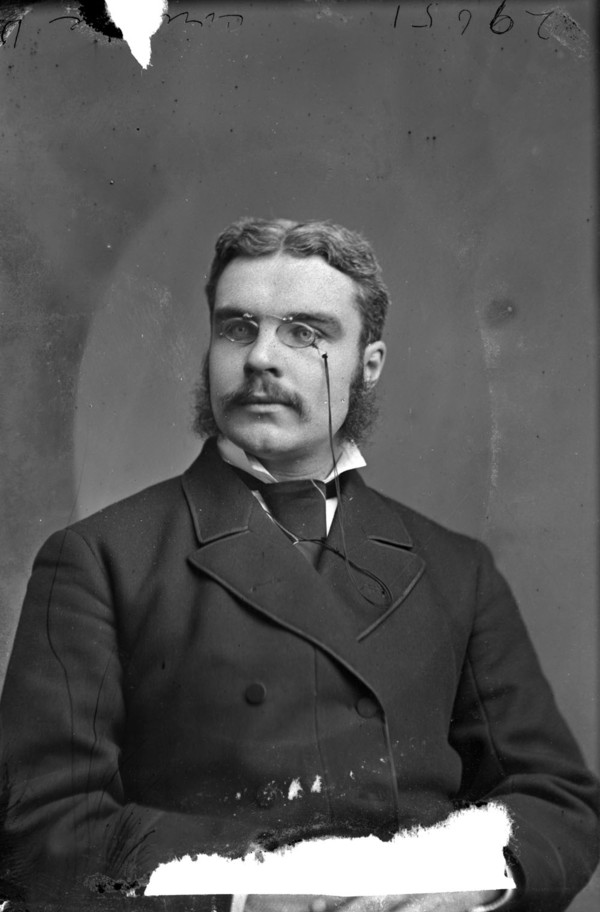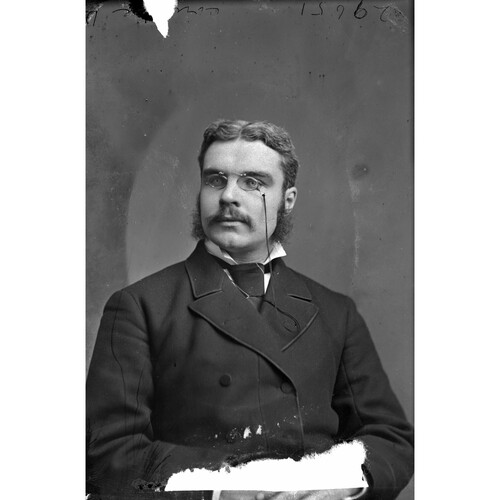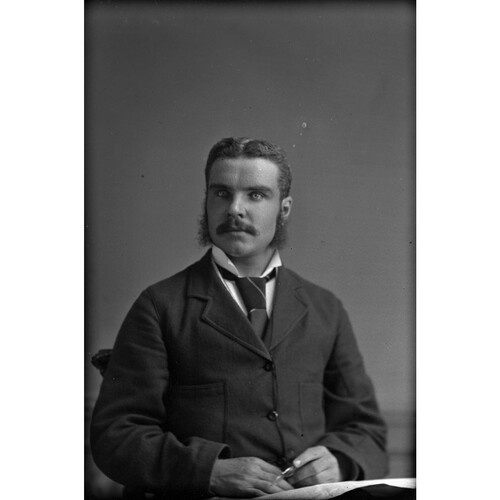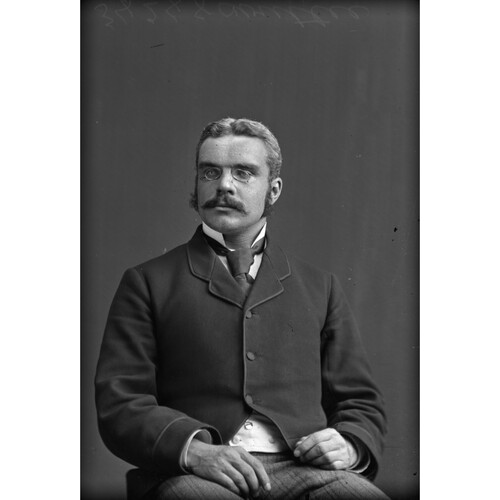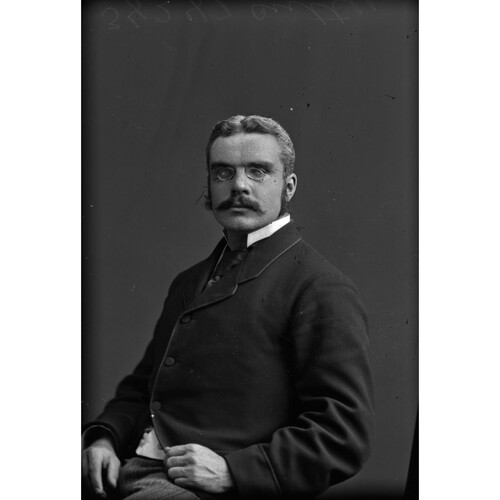COUTLÉE, LOUIS WILLIAM (his first names were sometimes written Louis William P.), lawyer, office holder, and militia officer; b. 17 Dec. 1851 at Oakland Lodge near Aylmer, Lower Canada, son of Louis Maurille Coutlée and Jane Maria Clegg; m. 7 April 1880, in Kingston, Ont., Charlotte Margaret Wilson of Belleville, and they had one son and three daughters; d. 2 May 1917 in Ottawa.
Although William Coutlée’s family claimed an aristocratic French ancestry dating back to the reigns of Henri IV and Louis XIV, from all appearances by the mid 19th century it was thoroughly acculturated to English Quebec. Coutlée’s father was a miller, a militia officer, and sheriff of the district of Ottawa. William and his younger brother would follow their father into military service and public office. Coutlée grew up in Aylmer and attended high school there before beginning a term of unknown duration at the Collège Masson in Terrebonne and law studies at McGill College. Revealing his talents early, he published An alphabetical index of the Code of Civil Procedure of Lower Canada in 1870. McGill awarded him a bcl in 1873. Called to the bar of the province of Quebec the same year, Coutlée, aged 21, began articling in Ontario, likely for the two-year minimum required of those who already held a baccalaureate. In 1875 he was called to the bar of Ontario. Since the family apparently depended to some degree on patronage from the Conservative party, the Liberal reign of the mid 1870s forced him to seek employment other than in government service. From 1880, if not earlier, to 1882 he practised in Ottawa.
Coutlée was part of a large group of central Canadian lawyers who were drawn to Manitoba by its flourishing economic conditions, but he arrived in 1882, just as the real estate boom collapsed. Fortunately, he became deputy attorney general and law clerk of the Legislative Assembly of Manitoba in 1883, achieving a measure of financial security. The following year his annual remuneration as clerk was reportedly $800, combined with $2,000 as deputy attorney general. He was not able to practise law until his admission to the Manitoba bar in 1885.
Coutlée was employed by the Manitoba government at a challenging time. If the province was to counter Ontario’s claim to the disputed border territory in the District of Keewatin [see Sir Oliver Mowat*], a judicial and administrative presence was required there. Coutlée organized Keewatin’s judicial structures while also managing the entire attorney general’s department for the province. Serving also as municipal commissioner, he likely advised and assisted in drafting the Municipal Act of Manitoba in 1886 and he subsequently supervised the organization of the provincial municipal system.
Coutlée continued a keen interest in the militia which had begun at age 15. Brief and uneventful terms of duty during the Fenian raids of 1866 and the Fenian scare of 1870 [see John O’Neill*] resulted in a medal. In spring 1885, when the North-West rebellion broke out [see Louis Riel*], he became involved. By then a captain commanding the Winnipeg Field Battery, he served over three months in a column under Major-General Frederick Dobson Middleton* and was present at the battles of Fish Creek and Batoche (Sask.). For his part, he received a military medal. The following year he was promoted major and he commanded the Winnipeg Field Battery until 1895. He reportedly served as vice-president of the Canadian Artillery Association, but the length of his term is not known.
While deputy attorney general, Coutlée sometimes acted for the crown in criminal prosecutions, but a more important activity was the administration of land registration. The ever-increasing number of transactions in the province underlined the shortcomings of the uncertain and inefficient system for registering and legally validating land transfers. The system had been largely borrowed from Ontario in 1870 and incorporated into the Provincial Registry Act. The exact part that Coutlée played in the drafting of the Real Property Act of 1885, although probably substantial, is unclear, but the impact of the legislation was far-reaching. The Torrens system of land registration which was adopted for use throughout western Canada after consultations with officials from Australia, where it had originated, meant that certificates of entitlement could be guaranteed by the provincial government through a land registry office. This change eliminated earlier problems of conveyance associated with costly legal searches of land devolution and frequently unclear titles. In 1887 Coutlée was appointed registrar general, the chief officer responsible for carrying out the new land registration system. In 1890 he would write a book entitled A manual of the law of registration of titles to real estate in Manitoba and the North-West Territories. The work, which was well received by lawyers, established his reputation internationally as the authority on matters of land registry.
Coutlée was dramatically dismissed in 1889 after the irascible and vindictive Joseph Martin* had been appointed attorney general in the Liberal government of Thomas Greenway*. Apparently when Martin, a lawyer, was in private practice, Coutlée had once offended him by refusing to approve a registration, at the time engaging Martin in strong words and ordering him to leave his office. Bent on revenge, Martin successfully recommended to the Executive Council that the position of registrar general be abolished and he then reportedly marched promptly to Coutlée’s office and handed him the order in council. The position was re-established on Martin’s recommendation a year later. The incident was a cruel reminder to senior civil servants such as Coutlée that partisan realities and individual wills could render their positions tenuous in spite of their invaluable expertise.
Coutlée probably remained in private practice in Winnipeg until 2 Dec. 1895 when he was appointed assistant reporter of the Supreme Court of Canada, initially over strong objections from Quebec. With the compilation of several digests of cases, published in 1899, 1904, 1907, and 1909, however, he proved his value to the court. While residing in Ottawa, Coutlée joined the élite of society as a member of the Rideau Club. He died in that city, leaving a modest estate.
Louis William Coutlée is the author of An alphabetical index of the Code of Civil Procedure of Lower Canada (Montreal, 1870) and A manual of the law of registration of titles to real estate in Manitoba and the North-West Territories (Toronto, 1890). As assistant reporter of the Supreme Court of Canada, he helped prepare the Canada Supreme Court Reports (Ottawa), vols.25–54, and was the compiler of Coutlée’s collection of notes of unreported cases in the Supreme Court of Canada, 1875–1907 (Toronto, 1907) and Digest of cases determined by the Supreme Court of Canada . . . 1893–1898 . . . (Toronto, 1899), 1875 to 20 October 1903 (1904), and [1904–8] (1909).
AO, RG 22-354, no.8313; RG 80-5-0-89, no.2948. NA, RG 9, II, A5, 2: 36; 6: 99; F7, Winnipeg Field Battery, March–June 1885. Manitoba Free Press, 31 Oct., 1 Nov. 1895; 8 May 1917. Canadian biog. dict. Canadian men and women of the time (Morgan; 1912). Dale and Lee Gibson, Substantial justice; law and lawyers in Manitoba, 1670–1970 (Winnipeg, 1972). Man., Legislative Assembly, Journals, 1884; “Sessional papers,” 1886, no.1. Manitoba Reports (Winnipeg), 1887–95. Pioneers of Man. (Morley et al.). E. A. Pridham, “The title to land in Manitoba,” Man., Hist. and Scientific Soc., Papers (Winnipeg), 3rd ser., no.13 (1957–58): 7–26. J. P. Robertson, A political manual of the province of Manitoba and the North-West Territories (Winnipeg, 1887). L.-H. Taché, A legal hand-book and law list for the Dominion of Canada and a book of parliamentary and general information (Toronto, 1888). R. A. Willie, “‘These legal gentlemen’: becoming prominent in Manitoba, 1870–1900” (phd thesis, Univ. of Alta, Edmonton, 1989).
Cite This Article
Richard A. Willie, “COUTLÉE, LOUIS WILLIAM (Louis William P.),” in Dictionary of Canadian Biography, vol. 14, University of Toronto/Université Laval, 2003–, accessed February 26, 2026, https://www.biographi.ca/en/bio/coutlee_louis_william_14E.html.
The citation above shows the format for footnotes and endnotes according to the Chicago manual of style (16th edition). Information to be used in other citation formats:
| Permalink: | https://www.biographi.ca/en/bio/coutlee_louis_william_14E.html |
| Author of Article: | Richard A. Willie |
| Title of Article: | COUTLÉE, LOUIS WILLIAM (Louis William P.) |
| Publication Name: | Dictionary of Canadian Biography, vol. 14 |
| Publisher: | University of Toronto/Université Laval |
| Year of publication: | 1998 |
| Year of revision: | 1998 |
| Access Date: | February 26, 2026 |


